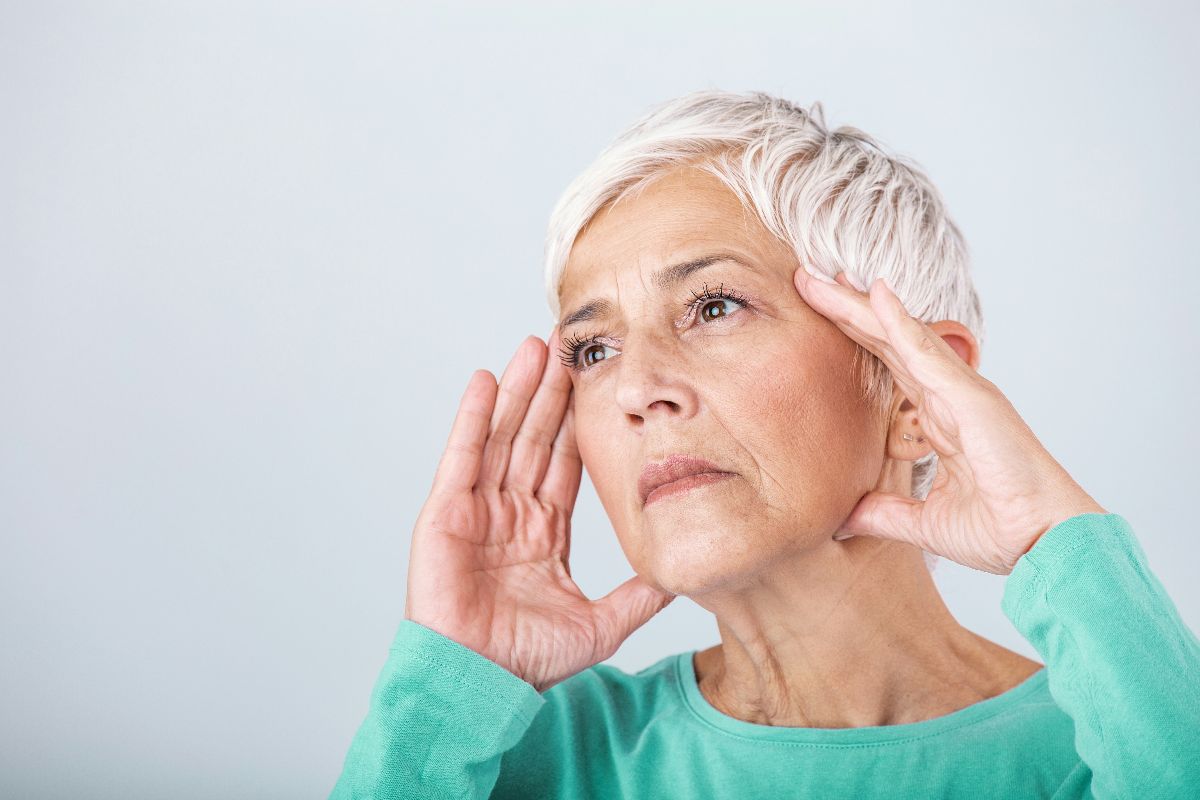Hormonal changes can bring about a range of symptoms, and experiencing hot flashes and headaches at the same time can be both confusing and distressing. These symptoms often intertwine, leaving you searching for answers and relief. Understanding the underlying causes of this dual discomfort is crucial for managing your health effectively. While menopause and headaches can be related, the combination of hot flashes and headaches can stem from various factors, including perimenopause and other hormonal fluctuations. By delving into the intricate relationship between these symptoms, you'll gain valuable insights into your body's signals and discover strategies to alleviate discomfort. Let's explore the potential causes and solutions to help you regain control of your well-being.
Why do headaches and hot flashes happen together?
The simultaneous occurrence of headache hot flashes and migraines can be attributed to hormonal fluctuations, particularly during perimenopause and menopause. Changes in estrogen levels (1) can significantly impact headache-related chemicals in the brain, potentially worsening symptoms.
Hormonal imbalance
During perimenopause, the body experiences irregular fluctuations in hormone levels, especially estrogen. These fluctuations can trigger both hot flashes and migraines. Individuals experiencing both (2) migraines and persistent vasomotor symptoms like hot flashes earlier in adulthood may face increased cardiovascular risks.
Shared triggers
Many factors can exacerbate both hot flashes and headaches, including stress, caffeine, alcohol, and spicy foods. Manage these triggers through lifestyle changes may help alleviate both symptoms simultaneously.
Neurological connection
The hypothalamus, responsible for regulating body temperature, is also involved in headache pathophysiology. A defect in central thermoregulatory function (3) may contribute to hot flashes, potentially explaining the connection between these symptoms and headaches.
Understanding the interplay between hot flashes and migraines can help in developing more effective management strategies for those experiencing these concurrent symptoms.
Causes of headaches and hot flashes
Hormonal fluctuations
Hormonal changes are a primary cause of both headaches and hot flashes, especially during perimenopause and menopause. The rapid drop in estrogen levels before menstruation can trigger headaches and migraines in many individuals. Similarly, fluctuating estrogen levels during menopause can disrupt the body's temperature regulation, leading to hot flashes.
Stress and anxiety
Stress and anxiety can exacerbate both headache hot flashes and migraines. In fact, hot flashes and anxiety often go hand in hand, as emotional stress is a common trigger.
💡 Tension and anxious feelings can also contribute to headaches, making symptoms more intense.
Managing stress through relaxation techniques and lifestyle changes may help alleviate these symptoms.
Medications and substances
Certain medications, including hormone replacement therapy, can either improve or worsen headaches and hot flashes, depending on the individual. Caffeine, alcohol, and spicy foods are known triggers for hot flashes and can also contribute to headaches in some people.
Environmental factors
Hot weather, warm environments, and tight clothing can trigger hot flashes. These factors, combined with dehydration or poor sleep, may also contribute to headaches.
💡 Maintaining a cool environment and staying hydrated can help manage both hot flashes and migraines.
Are hot flashes and headaches always related to menopause?
While hot flashes and headaches are commonly associated with menopause, they are not always directly related or exclusive to this life stage. Hot flashes can be caused by various factors beyond hormonal changes, including thyroid disorders and certain medications.
Multiple causes of hot flashes and migraines
Hot flashes and migraines can occur due to several underlying conditions. Over 75% of menopausal individuals (4) experience hot flashes, but they can also result from:
- Breast cancer treatments
- Pregnancy or recent childbirth
- Multiple sclerosis
- Prostate and testicular cancer treatments
- Thyroid disorders
Non-menopausal triggers
Even outside of menopause, certain triggers can induce hot flashes and headaches. These may include spicy foods, alcohol, caffeine, stress, and tight clothing. Medical conditions like diabetes, fibromyalgia, and anxiety can also cause similar symptoms.
How do these symptoms affect daily life?
Physical disruptions
Hot flashes and headaches can significantly impact your daily activities.
The sudden waves of intense heat, often accompanied by flushing and sweating, can be highly disruptive. These symptoms may interfere with work, social interactions, and overall comfort. For those experiencing migraines along with hot flashes, the physical toll can be even more severe.
Research shows (5) that migraine symptoms often worsen during the menopausal transition, increasing the number of headache days per month and further compromising daily functioning.
Psychological and emotional impact
The unpredictable nature of hot flashes and headaches can lead to anxiety and stress. Studies indicate (6) that up to 70% of menopausal individuals experience psychological symptoms like mood changes and anxiety.
The combination of physical discomfort and emotional distress can affect self-esteem and social interactions. Moreover, when these symptoms occur at night as night sweats, they can severely disrupt sleep patterns.This sleep disruption can lead to fatigue, irritability, and difficulty concentrating, further impacting overall quality of life and daily productivity.
How can you relieve hot flashes and headaches?
Natural and lifestyle remedies
To manage hot flashes and associated headaches, start by identifying and avoiding common triggers. These may include warm environments, spicy foods, caffeine, and alcohol—some of the typical foods to avoid during menopause. Staying hydrated and using cooling methods like cold water, fans, and layered clothing can provide immediate relief.
Stress management techniques such as deep breathing exercises, yoga, and meditation can help reduce the frequency and intensity of hot flashes. Regular exercise in a cool environment may also alleviate symptoms while promoting overall health.
Hormone replacement therapy
For those experiencing severe symptoms, hormone replacement therapy (HRT) remains the most effective treatment for hot flashes. HRT supplements the body with estrogen and/or progesterone to stabilize hormone levels. However, it's crucial to discuss potential risks and benefits with a healthcare provider, as HRT may not be suitable for everyone.
Non-hormonal medications
Non-hormonal options can provide relief for those who cannot or prefer not to use HRT. These include:
- Antidepressants like selective serotonin reuptake inhibitors (SSRIs)
- Gabapentin, an anti-seizure medication
- Clonidine, typically used for blood pressure control
These medications can help manage both hot flashes and headaches by affecting neurotransmitters involved in temperature regulation and pain perception.
Remember, the effectiveness of treatments can vary. Work closely with your healthcare provider to find the most suitable approach for managing your headache hot flashes and hot flashes and migraines.
The interplay between hot flashes and headaches often stems from hormonal fluctuations, particularly during perimenopause and menopause. Understanding this connection is crucial for managing these symptoms effectively. While these experiences can be challenging, numerous strategies exist to alleviate discomfort and improve quality of life. From lifestyle modifications to medical interventions, options are available to suit individual needs and preferences. By working closely with healthcare providers and exploring various treatment approaches, it's possible to find relief and regain a sense of control. Remember, each person's journey is unique, and with patience and persistence, you can develop a personalized plan to address these symptoms and enhance overall well-being.
Sources:
- https://www.mayoclinic.org/diseases-conditions/chronic-daily-headaches/in-depth/headaches/art-20046729
- https://www.health.harvard.edu/womens-health/migraines-plus-early-menopause-symptoms-may-add-up-to-cardiovascular-risks
- https://www.ncbi.nlm.nih.gov/books/NBK539827/
- https://www.webmd.com/menopause/why-so-hot
- https://pmc.ncbi.nlm.nih.gov/articles/PMC7542111/
- https://www.ncbi.nlm.nih.gov/books/NBK507826/





